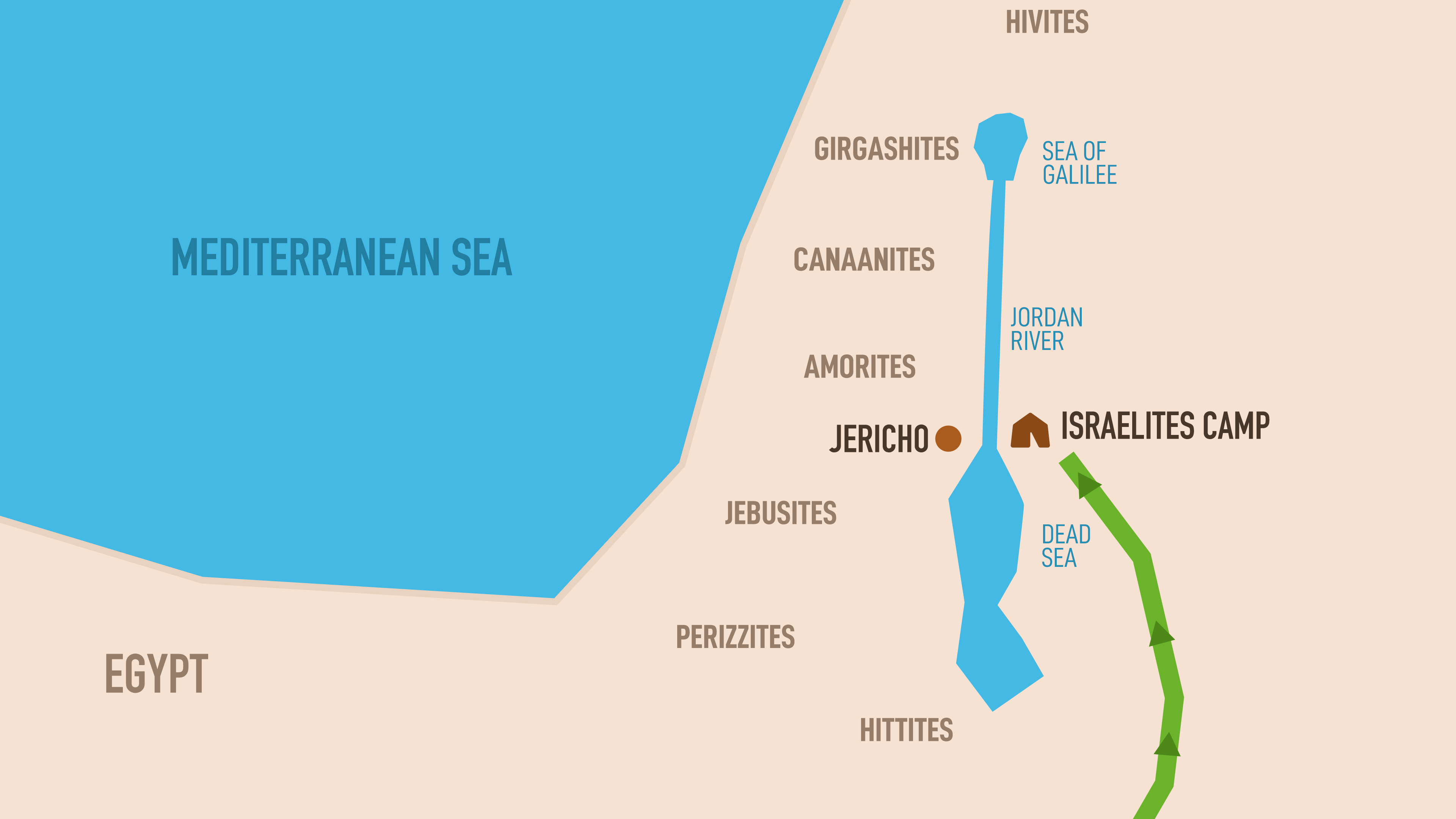Joshua's Commission and the Crossing of the Jordan
Review of Lesson #1: Introduction and Context
Key Points Covered:
1. Overview of the Books of Joshua and Judges:
- Joshua: Focuses on the leadership of Joshua and the conquest and settlement of the Promised Land.
- Judges: Describes the period after Joshua's death, highlighting the cyclical pattern of Israel's faithfulness and disobedience, and the rise of various judges as deliverers.
2. Historical Context:
- Period: Approximately 1400-1200 BC.
- Transition: The transition from Moses' leadership to Joshua marks a significant shift from wandering in the wilderness to conquering and settling in the Promised Land.
3. Significance of the Promised Land:
- Divine Promise: The land was promised to Abraham and his descendants as a sign of God's covenant.
- Religious and Cultural Importance: It became the central place for Israel's identity, worship, and community life.
4. The Concept of Covenant:
- Definition: A binding agreement between God and His people, involving promises and obligations.
- Key Covenants: Abrahamic covenant (promise of land and descendants), Mosaic covenant (law given at Sinai), and the ongoing renewal and emphasis on covenant faithfulness throughout the books.
5. Leadership Roles:
- Moses: Led the Israelites out of Egypt and through the wilderness, establishing the foundation of the nation and its laws.
- Joshua: Led the conquest of Canaan and the settlement of the Promised Land, fulfilling God's promises to the patriarchs.
Thematic Elements:
- Faith and Obedience: The success of Joshua and the early judges highlights the importance of trusting and obeying God's commands.
- Leadership and Legacy: Effective leadership, as seen in Moses and Joshua, has a lasting impact on the individual, church and the world.
- Church and Covenant: The covenant relationship involves the entire church, emphasizing collective responsibility and faithfulness.
Preparing for Lesson #2:
In the next lesson, we will delve into Joshua's commission and the miraculous crossing of the Jordan River (Joshua 1-4). Key themes to focus on include:
- Joshua's leadership and his initial steps in leading Israel.
- The importance of God's promises and the people's faith in entering the Promised Land.
- The symbolism and significance of crossing the Jordan River.
As we move forward, keep in mind the foundational principles of faith, obedience, and covenant faithfulness that we discussed in Lesson #1. These themes will continue to be central as we explore the events and lessons in the Book of Joshua.
I. God's Commissioning of Joshua – Joshua 1:1-9
Essential Elements of Joshua's Commissioning in Joshua 1:1-9
Joshua 1:1-9 marks a pivotal moment in the history of Israel, where Joshua is formally commissioned to lead the Israelites after Moses' death. This passage outlines several key elements of his commissioning:
1. Divine Appointment (Verses 1-2)
Transition of Leadership: The passage begins with God speaking directly to Joshua, signifying the transition of leadership from Moses to Joshua. God states, "Moses my servant is dead. Now therefore arise, go over this Jordan, you and all this people, into the land that I am giving to them, to the people of Israel" (Joshua 1:2).
Clear Mandate: Joshua is given a clear mandate to lead the people across the Jordan River into the Promised Land, affirming his role as the new leader. There will be no doubt in Joshua or the people's mind as to his role of leadership.
2. Promise of the Land (Verses 3-4)
Land Boundaries: God reiterates the promise of the land, specifying its boundaries from the wilderness and Lebanon to the Euphrates River and the Mediterranean Sea. This reinforces the fulfillment of the covenant promise made to Abraham and his descendants.
3. Assurance of God's Presence (Verse 5)
Divine Presence: God assures Joshua that He will be with him just as He was with Moses. "No man shall be able to stand before you all the days of your life. Just as I was with Moses, so I will be with you. I will not leave you or forsake you" (Joshua 1:5).
Source of Strength: This assurance is meant to be a source of strength and confidence for Joshua, emphasizing that his success will come from God's continual presence and support.
4. Call to Courage and Obedience (Verses 6-7, 9)
Command to Be Strong and Courageous: Joshua is repeatedly commanded to be strong and courageous (verses 6, 7, and 9). This call to courage is crucial, given the challenges he will face in leading the Israelites and conquering the land.
Adherence to the Law: In verse 7, God instructs Joshua to carefully obey all the law given through Moses, not turning from it to the right or the left. This obedience is linked to prosperity and success in his endeavors.
5. Meditation on the Law (Verse 8)
Continual Study and Application: Joshua is instructed to keep the Book of the Law always on his lips, meditating on it day and night. This continuous engagement with God's word is intended to guide his actions and decisions, ensuring that he leads the people in accordance with God's commands.
6. Encouragement and Reassurance (Verse 9)
Final Reassurance: The passage concludes with a final encouragement and reassurance: "Have I not commanded you? Be strong and courageous. Do not be frightened, and do not be dismayed, for the Lord your God is with you wherever you go." This reinforces the themes of divine presence, courage, and steadfastness in the face of challenges.
II. Response to Joshua's Commissioning – Joshua 1:10-18
After receiving his commissioning from God, Joshua immediately takes action and rallies the people. This passage highlights Joshua's decisive leadership and the people's unified response, demonstrating their readiness to follow him into the Promised Land.
1. Joshua's Command to the Officers (Verses 10-11)
Immediate Action: Joshua does not hesitate after receiving his commission. He commands the officers of the people to go throughout the camp and instruct the people to prepare provisions, as they will cross the Jordan River in three days to take possession of the land.
Decisive Leadership: This prompt action showcases Joshua's confidence and readiness to lead, instilling a sense of urgency and purpose among the people.
2. Instructions to the Transjordan Tribes (Verses 12-15)
Reminder of Commitment: Joshua addresses the Reubenites, Gadites, and the half-tribe of Manasseh, reminding them of their commitment made to Moses. Although their inheritance was east of the Jordan (they wanted to settle there because the land was suitable for grazing their herds of animals), they were to first help their fellow Israelites in conquering the land west of the Jordan before returning home to settle their own inheritance.
Call to Unity and Support: Joshua emphasizes unity and mutual support, urging these tribes to leave their families and livestock behind temporarily and join the fight until the Lord gives rest to their brothers.
3. The People's Affirmation (Verses 16-18)
Unanimous Support: The people respond positively to Joshua's leadership. They affirm their commitment, saying, "All that you have commanded us we will do, and wherever you send us we will go."
Acknowledgment of Authority: They recognize Joshua's authority in the same way they respected Moses, expressing their willingness to obey him completely.
Prayers for Divine Presence: The people pray that the Lord will be with Joshua as He was with Moses, acknowledging the importance of divine guidance and support for their success.
Encouragement and Call for Courage: They echo God's earlier command to Joshua, urging him to be strong and courageous. This mutual encouragement reinforces the collective resolve and confidence in their mission.
Summary
Joshua and the people's response to his commissioning highlights several key aspects:
- Joshua's Leadership: Joshua's immediate and decisive action demonstrates his readiness to lead and instills confidence in the people.
- Unity and Commitment: The willingness of the Transjordan tribes to honor their commitment and the people's overall readiness to follow Joshua reflect a unified and committed people.
- Recognition of Authority: The people's affirmation of Joshua's authority and their prayers for divine presence emphasize the importance of godly leadership.
- Mutual Encouragement: The reciprocal encouragement to be strong and courageous highlights a shared resolve and trust in God's promises.
This response sets a positive tone for the upcoming conquest of the Promised Land, showcasing the people's readiness to move forward under Joshua's leadership, united in purpose and faith. This was truly a high point in their history as the people of God.
III. Rahab and the Spies – Joshua 2:1-24

The story of Rahab and the spies, found in Joshua 2, is a familiar and significant narrative in the Bible. As the Israelites prepare to enter the Promised Land, Joshua sends two spies to scout the city of Jericho. They enter the city and lodge in the house of Rahab, a prostitute.
Key Events
1. Spies Sent to Jericho
Joshua dispatches two spies to secretly explore Jericho and gather intelligence on the city's defenses and inhabitants.
2. Rahab's Protection
Rahab, recognizing the spies as Israelites, hides them on her roof under stalks of flax when the king of Jericho's men come searching for them. She tells the king's men that the spies have already left the city, misleading them to protect the spies.
3. Rahab's Confession of Faith
Rahab reveals to the spies that the people of Jericho are terrified of the Israelites because they have heard of God's miraculous deeds, such as the parting of the Red Sea and the defeat of the Amorite kings. She expresses her belief that the Lord has given the land to the Israelites.
4. Promise of Protection
Rahab requests safety for herself and her family in return for her help. The spies agree, instructing her to tie a scarlet cord in her window as a sign. They promise that anyone in her house will be spared during the impending attack on Jericho.
5. Spies' Report
After escaping from Jericho, the spies return to Joshua and report that the land is indeed fearful of the Israelites, bolstering Joshua's confidence to proceed with the conquest.
Significance of the Event
1. Demonstration of God's Sovereignty
The story highlights God's control over events, as even a Canaanite woman recognizes His power and aligns herself with His people. This shows that God's influence extends beyond Israel and that His plans will be fulfilled despite opposition.
2. Theme of Faith and Redemption
Rahab's faith in God and her actions to protect the spies illustrate that faith can be found in unexpected places and people. Her inclusion in the genealogy of Jesus (Matthew 1:5) underscores the theme of redemption and the transformative power of faith.
3. Foreshadowing of Israel's Victory
The spies' successful mission and Rahab's report of Jericho's fear foreshadow the eventual fall of Jericho and the successful conquest of the Promised Land. It reassures the Israelites that God is with them and that their enemies are already demoralized.
4. Covenant Loyalty and Inclusion
Rahab's story emphasizes the concept of covenant loyalty. Despite being a Canaanite, Rahab's faith and actions bring her and her family into the protection and blessings of Israel. This inclusion signifies that God's covenant extends to all who believe and act in faith, regardless of their background.
The narrative of Rahab and the spies thus serves multiple purposes: it demonstrates God's sovereignty, illustrates the power of faith and redemption, foreshadows Israel's victory, and emphasizes the inclusive nature of God's covenant.
IV. The Miraculous Crossing and The Memorial Stones

Chapter 3: Crossing the Jordan River
1. Preparations and Instructions
Joshua instructs the people to sanctify themselves in preparation for crossing the Jordan River, as the Lord will do wonders among them (Joshua 3:5).
The officers instruct the people to follow the Ark of the Covenant carried by the Levitical priests, maintaining a distance of about 2,000 cubits (approximately 1,000 yards) to symbolize the sacredness of the Ark and to guide the people (Joshua 3:3-4).
2. Priests Enter the Jordan
As soon as the priests carrying the Ark step into the Jordan River, the waters upstream stop flowing and pile up in a heap, allowing the Israelites to cross on dry ground (Joshua 3:15-16).
The entire nation crosses the Jordan, with the priests standing on dry ground in the middle of the riverbed until everyone has crossed over (Joshua 3:17).
Chapter 4: Setting the Memorial Stones
1. Collection of Stones
God instructs Joshua to select twelve men, one from each tribe, to take twelve stones from the middle of the Jordan, where the priests stood, and carry them to the place where they would camp that night (Joshua 4:2-3).
2. Setting Up the Memorial
The twelve stones are set up at Gilgal as a memorial to the miraculous crossing of the Jordan. Joshua explains that these stones will serve as a sign among the Israelites, prompting future generations to ask about their significance (Joshua 4:6-7, 20-22).
The memorial stones are intended to remind the Israelites of God's mighty acts and to reinforce the importance of teaching future generations about the faithfulness and power of God (Joshua 4:21-24).
Theological Significance
A. The Priests' Role
1. Mediators of God's Presence
The priests, carrying the Ark of the Covenant, symbolize God's presence and leadership. By stepping into the Jordan first, they mediate God's power and initiate the miracle. This act demonstrates that the crossing is not by human effort but by divine intervention.
Their role underscores the importance of spiritual leadership and the necessity of God's presence in overcoming obstacles and achieving His promises.
2. Symbol of Faith and Obedience
The priests' act of stepping into the flooded Jordan River before the waters part signifies a profound act of faith and obedience. It serves as a model for the Israelites, showing that faith often requires stepping into uncertain and challenging situations, trusting in God's provision and power.
B. The Memorial Stones
1. Remembrance of God's Mighty Acts
The stones serve as a physical reminder of God's miraculous intervention. They are a tangible testimony to future generations of how God dried up the Jordan, allowing the Israelites to enter the Promised Land.
This act of remembrance is crucial in maintaining faith and ensuring that God's deeds are not forgotten over time. It reinforces the concept of historical memory in the community's faith life.
2. Teaching Tool for Future Generations
The memorial stones are intended to provoke questions from future generations, creating opportunities to recount God's faithfulness and power. This ensures that the story of God's salvation is passed down, fostering a continuous sense of identity and purpose rooted in divine history.
It emphasizes the importance of educating children in the faith and ensuring that the knowledge of God's works is preserved and celebrated.
3. Covenant Renewal
The setting of the stones at Gilgal, the first campsite in the Promised Land, marks a new phase in the fulfillment of God's covenant promises. It signifies a renewal of the covenant relationship as the people transition from wandering to settling in the land God promised to their ancestors.
It serves as a reminder of God's faithfulness to His covenant and the people's responsibility to live in accordance with His laws and commands.
In summary, the events in Joshua 3 and 4 emphasize the significance of faith, obedience, and remembrance in the life of the Israelites. The priests' role in the crossing of the Jordan River highlights the necessity of God's presence and leadership, while the memorial stones serve as enduring symbols of God's power and faithfulness, ensuring that future generations understand and appreciate their Divine heritage.
V. Lessons
As we normally do in our studies, I would like to end with a few take away lessons. This time, however, I'd like to share a spiritual application, a practical application and a timeless application based on the first four chapters of Joshua.
Lessons Based on Joshua Chapters 1-4
A. Spiritual Application: Trust in God's Promises
Lesson: Joshua's commissioning and the miraculous crossing of the Jordan River underscore the importance of trusting in God's promises and His timing. The Israelites' successful entry into the Promised Land was predicated on their faith in God's guidance and their obedience to His commands.
Application: In our spiritual lives, we are called to trust in God's promises even when faced with seemingly insurmountable challenges. Like Joshua and the Israelites, we should step out in faith, confident that God will make a way where there seems to be no way. This trust can strengthen our relationship with God and deepen our reliance on His providence.
B. Practical Application: Importance of Leadership & Preparation
Lesson: Joshua's leadership and the meticulous preparations for crossing the Jordan highlight the importance of effective leadership and thorough preparation in achieving success. Joshua's clear instructions and the people's organized response were crucial for the smooth execution of God's plan.
Application: In our daily lives, whether in personal endeavors or professional projects, strong leadership and careful planning are vital. By preparing adequately and leading with clarity and confidence, we can navigate challenges and guide others towards achieving common goals. This principle can be applied in various contexts, from family management to business operations.
C. Timeless Application: The Power of Remembrance and Legacy
Lesson: The setting up of the memorial stones at Gilgal illustrates the timeless value of remembrance and the importance of passing down stories of faith and divine intervention to future generations. These stones served as a perpetual reminder of God's faithfulness and the miraculous crossing of the Jordan.
Application: The practice of remembering and sharing significant events and lessons is crucial across all generations. In our lives, we can establish "memorials" in various forms—through storytelling, journaling, or creating physical reminders—that capture important moments and lessons. This helps ensure that valuable experiences and spiritual insights are preserved and imparted to future generations, fostering a sense of continuity and shared heritage.
These applications from Joshua chapters 1-4 provide valuable insights that can enrich our spiritual journey, enhance our practical decision-making, and ensure the preservation of our legacy and faith for our families and brethren in Christ.





